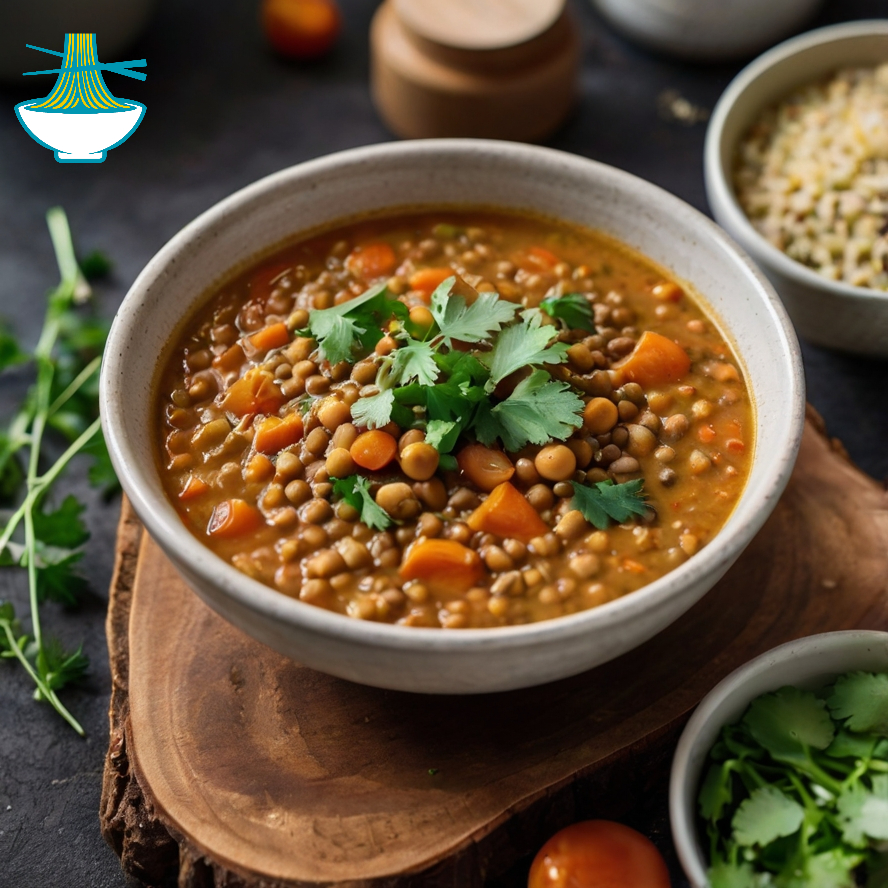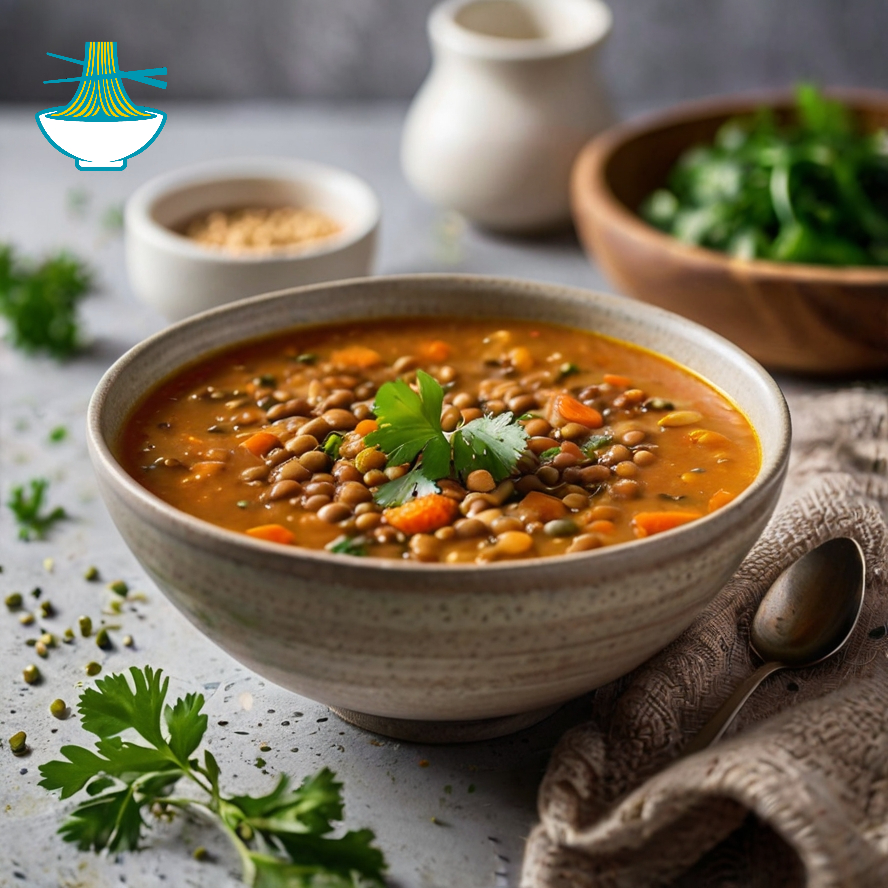Vegan Lentil Soup is a nourishing and hearty dish that's perfect for chilly days. Made with red or green lentils and a mix of vegetables such as carrots, celery, and tomatoes, this soup is not only rich in plant-based protein but also quick and easy to prepare. It serves as a healthy and satisfying meal, ideal for daily consumption.

Lentil soup has been a staple in various cultures for centuries due to lentils' accessibility and nutritional value. Known for their high protein content and versatility, lentils have been used in soups across the Middle East, Mediterranean, and beyond. This vegan version highlights the timeless appeal of lentil soup while catering to contemporary dietary preferences.
Ingredients:
- 1 tablespoon olive oil
- 1 onion, chopped
- 2 cloves garlic, minced
- 2 carrots, diced
- 2 celery stalks, diced
- 1 cup red or green lentils, rinsed
- 1 can (14.5 oz) diced tomatoes
- 4 cups vegetable broth
- 1 teaspoon ground cumin
- 1 teaspoon paprika
- Salt and pepper to taste
- Fresh lemon juice (optional)
- Whole-grain bread (optional)
Method of Preparation:
1. Heat Olive Oil: In a large pot, heat the olive oil over medium heat.
2. Sauté Vegetables: Add the chopped onion, garlic, carrots, and celery. Cook until the vegetables are softened, about 5 minutes.
3. Add Lentils and Tomatoes: Stir in the rinsed lentils and diced tomatoes.
4. Add Broth and Spices: Pour in the vegetable broth and add ground cumin, paprika, salt, and pepper. Bring to a boil.
5. Simmer: Reduce the heat and let the soup simmer for 25-30 minutes, or until the lentils are tender.
6. Adjust Seasoning: Taste and adjust seasoning as needed. Optionally, add a splash of fresh lemon juice for brightness.
7. Serve: Ladle the soup into bowls and serve with whole-grain bread, if desired.

Nutrition Value:
1. 1 tablespoon olive oil
- Calories: 119
- Carbohydrates: 0 g
- Protein: 0 g
- Fat: 14 g
- Sodium: 0 mg
- Cholesterol: 0 mg
- Vitamins: Rich in vitamin E
- Minerals: Contains calcium and iron
- Nutritional Benefit: Olive oil is high in monounsaturated fats, which support heart health and provide antioxidants.
2. 1 onion, chopped
- Calories: 46
- Carbohydrates: 11 g
- Protein: 1 g
- Fat: 0 g
- Sodium: 4 mg
- Cholesterol: 0 mg
- Vitamins: Good source of vitamins C and B6
- Minerals: Contains potassium and manganese
- Nutritional Benefit: Onions provide antioxidants and anti-inflammatory compounds that may boost immune function and support overall health.
3. 2 cloves garlic, minced
- Calories: 9
- Carbohydrates: 2 g
- Protein: 0 g
- Fat: 0 g
- Sodium: 1 mg
- Cholesterol: 0 mg
- Vitamins: Contains vitamin C
- Minerals: Provides manganese and calcium
- Nutritional Benefit: Garlic has antimicrobial properties and may support heart health by reducing blood pressure and cholesterol levels.
4. 2 carrots, diced
- Calories: 50
- Carbohydrates: 12 g
- Protein: 1 g
- Fat: 0 g
- Sodium: 42 mg
- Cholesterol: 0 mg
- Vitamins: Excellent source of vitamin A
- Minerals: Contains potassium and calcium
- Nutritional Benefit: Carrots are high in beta-carotene, which is converted into vitamin A and supports eye health and immune function.
5. 2 celery stalks, diced
- Calories: 12
- Carbohydrates: 3 g
- Protein: 1 g
- Fat: 0 g
- Sodium: 32 mg
- Cholesterol: 0 mg
- Vitamins: Contains vitamin K
- Minerals: Provides potassium and calcium
- Nutritional Benefit: Celery is low in calories and rich in antioxidants and fiber, which support digestive health and reduce inflammation.
6. 1 cup red or green lentils, rinsed
- Calories: 230
- Carbohydrates: 40 g
- Protein: 18 g
- Fat: 0.8 g
- Sodium: 4 mg
- Cholesterol: 0 mg
- Vitamins: High in B vitamins, especially folate
- Minerals: Rich in iron, magnesium, and zinc
- Nutritional Benefit: Lentils are a great source of plant-based protein and fiber, supporting muscle growth, digestion, and overall health.
7. 1 can (14.5 oz) diced tomatoes
- Calories: 70
- Carbohydrates: 15 g
- Protein: 3 g
- Fat: 0 g
- Sodium: 300 mg
- Cholesterol: 0 mg
- Vitamins: Contains vitamin C and vitamin A
- Minerals: Provides potassium and folate
- Nutritional Benefit: Tomatoes are rich in lycopene, an antioxidant that supports heart health and reduces the risk of certain cancers.
8. 4 cups vegetable broth
- Calories: 40
- Carbohydrates: 9 g
- Protein: 2 g
- Fat: 0 g
- Sodium: 800 mg
- Cholesterol: 0 mg
- Vitamins: Varies by brand, typically contains B vitamins
- Minerals: Often contains potassium and magnesium
- Nutritional Benefit: Vegetable broth adds flavor and essential nutrients while being low in calories and fat.
9. 1 teaspoon ground cumin
- Calories: 8
- Carbohydrates: 1 g
- Protein: 0 g
- Fat: 0.4 g
- Sodium: 1 mg
- Cholesterol: 0 mg
- Vitamins: Contains vitamins A, C, and E
- Minerals: Rich in iron and calcium
- Nutritional Benefit: Cumin has antioxidant properties and may aid digestion and support immune function.
10. 1 teaspoon paprika
- Calories: 6
- Carbohydrates: 1 g
- Protein: 0 g
- Fat: 0.3 g
- Sodium: 1 mg
- Cholesterol: 0 mg
- Vitamins: Contains vitamins A and E
- Minerals: Provides iron
- Nutritional Benefit: Paprika is rich in antioxidants and vitamins, contributing to eye health and reducing inflammation.
11. Salt and pepper to taste
- Calories: Negligible
- Carbohydrates: Negligible
- Protein: Negligible
- Fat: Negligible
- Sodium: Depends on the amount used
- Cholesterol: 0 mg
- Vitamins: None significant
- Minerals: Salt provides sodium; pepper has trace minerals
- Nutritional Benefit: Salt enhances flavor but should be used in moderation. Pepper contains antioxidants and may aid digestion.
12. Fresh lemon juice (optional)
- Calories: 4 per tablespoon
- Carbohydrates: 1 g
- Protein: 0 g
- Fat: 0 g
- Sodium: 0 mg
- Cholesterol: 0 mg
- Vitamins: High in vitamin C
- Minerals: Contains potassium
- Nutritional Benefit: Lemon juice adds a fresh, tangy flavor and provides vitamin C, which supports immune function and skin health.
13. Whole-grain bread (optional)
- Calories: 70-100 per slice
- Carbohydrates: 12-20 g
- Protein: 3-5 g
- Fat: 1-2 g
- Sodium: 120-200 mg
- Cholesterol: 0 mg
- Vitamins: Contains B vitamins
- Minerals: Provides iron and magnesium
- Nutritional Benefit: Whole-grain bread is a good source of fiber, supporting digestive health and providing sustained energy.


Comments